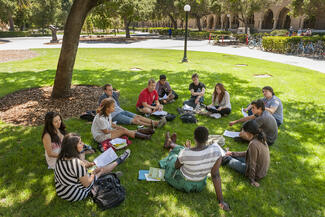
A multi-node quantum network of remote solid-state qubits
Physics & Astrophysics Building, Room 102/103
ABSTRACT: Future quantum networks [1] may harness the unique features of entanglement in a range of exciting applications, such as quantum computation and simulation, secure communication, enhanced metrology for astronomy and time-keeping as well as fundamental investigations. To fulfill these promises, a strong worldwide effort is ongoing to gain precise control over the full quantum dynamics of multi-particle nodes and to wire them up using quantum-photonic channels.
Here, we present our most recent work on the realization and application of a three-node entanglement-based quantum network based on diamond NV centers. We demonstrate several quantum network protocols without post-selection: the distribution of genuine multipartite entangled states across the three nodes, entanglement swapping through an intermediary node [2], and qubit teleportation between non-neighbouring nodes [3]. This work establishes a novel platform for exploring, testing, and developing multi-node quantum network protocols and a quantum network control stack [4]. Moreover, we will discuss future challenges and prospects for quantum networks, including the role of next-generation integrated devices.
[1] Quantum internet: A vision for the road ahead, S Wehner, D Elkouss, R Hanson, Science 362 (6412), eaam9288 (2018).
[2] Realization of a multi-node quantum network of remote solid-state qubits, M. Pompili, S.L.N. Hermans, S. Baier et al., Science 372, 259-264 (2021).
[3] Qubit teleportation between non-neighboring nodes in a quantum network, S.L.N. Hermans, M. Pompili et al., arXiv:2110.11373 (2021).
[4] Experimental demonstration of entanglement delivery using a quantum network stack, M. Pompili, C. Delle Donne et al., arXiv:2111.11332 (2021).
BIO: Ronald Hanson (1976) is Distinguished Professor at Delft University of Technology and principal investigator at QuTech. He is one of the four founding professors of QuTech (2014), serving as its Scientific Director in 2016-2020. Ronald currently chairs the Executive Board of Quantum Delta NL, the foundation responsible for the National Agenda Quantum Technology.
Ronald’s research centers on exploring and controlling quantum-entangled states with the long-term goal of exploiting these in future quantum technologies such as quantum computing and quantum internet. His work combines quantum optics, solid-state physics, nuclear magnetic resonance, quantum information theory and nanofabrication. In 2014 his group made headlines by teleporting quantum data between electrons on distant solid-state chips. In 2015 he ended a decades-long scientific quest by performing the first loophole-free Bell test. In 2018 his group achieved the important milestone of generating quantum entanglement faster than it got lost. In the coming years he aims to build on these results to demonstrate the fundamentals of a future quantum internet, with a rudimentary network planned between several cities in the Netherlands.
Ronald has received several awards for his work, among which the Nicholas Kurti European Science Prize (2012), the Huibregtsen Award for Excellence in Science and Society (2016) and the John Stewart Bell Prize (2017). In 2019 he received the Spinoza Prize, the highest scientific award in the Netherlands. He was elected as member of the Royal Holland Society of Sciences and Humanities (KHMW) and of the Dutch Royal Academy of Sciences (KNAW), and Fellow of the American Physical Society. In 2020 he was appointed as the university’s 6th Distinguished Professor.
Q-FARM Seminars are held biweekly on Wednesdays, from 12-1pm. See website for our upcoming schedule.